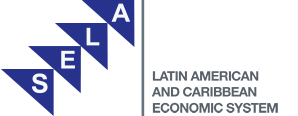BACKGROUND AND JUSTIFICATION
The Government of the Bolivarian Republic of Venezuela, through the People´s Ministry of Youth, requested support from the Permanent Secretariat of the Latin American and Caribbean Economic System (SELA) in order to organize a Meeting of high level officials of public policies for comprehensive care of Latin American and Caribbean youth, conceived in terms of equity and social inclusion from a comprehensive and cross-cutting perspective, which includes inter-institutional coordination and dialogue between the relevant State entities and youth. This event, which counts on the participation of high-level Latin American and Caribbean authorities and recognized specialists in the subject, is in line with the objectives of the Community of Latin American and Caribbean States (CELAC) 1 , regarding social inclusion and active participation of civil society in regional integration efforts, in which youth should become front-line stakeholders.
The background of this Meeting of Latin American and Caribbean senior officials on public policies for comprehensive care of youth: Inclusion and equality from a cross-cutting perspective is very significant in terms of the public policies especially designed to protect and promote the development of youth in those Latin American and Caribbean countries where they have been put into administrative practice through specific laws, and have resulted in programmes and projects for the creation of appropriate institutions.
Strictly speaking, “the challenge of growth with equity demands a strong process of investment in youth: Investment in quality education; in a guaranteed transition to decent jobs; sexual and reproductive health; social security and citizenship; in development programmes for participation and leisure, as well as entrepreneurship and innovation, among others. All of this under a cross-cutting vision that ensures coordinated and deep actions from the State, which should also generate spaces for dialogue with youth”2 .
The response to this challenge aims at searching for solutions to problems that have traditionally affected youth, which worsened in the first half of the 1980s. For this reason, the United Nations General Assembly declared 1985 as the “International Year of the Youth: Participation, Development and Peace”. However, despite the momentum that such initiative gave to care of youth at the governmental level, many public policymakers conceived policy on youth as another “sectoral policy”, which slowed down the efforts to incorporate the issue of young people into the national agendas so as to achieve their full social inclusion.
However, it must be noted, that the vast majority of Latin American and Caribbean countries have outlined and executed public policies on care of youth focused mainly on issues such as promoting peace and preventing violence, strengthening democratic values and youth participation, creating spaces for comprehensive care, training, reflection, studies and research, knowledge networks, generation of equity as regards access to information and communication technologies (ICTs), digital and technological literacy, vulnerability and social exclusion, inclusion in productive processes, higher levels of employability, decent work, and reproductive and sexual health rights, among others.
Additionally, there have been some noteworthy experiences in the area of youth care in the Caribbean, such as the Commonwealth Youth Programme Caribbean Centre, located in Georgetown, Guyana.
In view of the above, the Meeting of Latin American and Caribbean senior officials on public policies for comprehensive care of youth: Inclusion and equality from a cross-cutting perspective is relevant for the purposes of gaining knowledge and discussing about the experiences and ongoing programmes in Latin America and the Caribbean, so as to promote greater efficiency and effectiveness in designing, developing and evaluating such programmes, and to contribute to the consolidation of a Latin American and Caribbean forum for permanent exchange and contact among ministries and national and regional governmental institutions in charge of public policies on youth.
1 Caracas Action Plan. Community of Latin American and Caribbean States (CELAC). Caracas, CELAC, 2011. [Available at: http://www.sela.org/attach/258/default/Plan_de_Accion_de_Caracas.pdf] [Consulted on 17 June 2013].
2 20 Best Practices in Public Policies on Youth. Ibero-American Youth Organization; United Nations Development Programme; United Nations Population Fund; Economic Commission for Latin America and the Caribbean; United Nations Educational, Scientific and Cultural Organization. November 2012. [Available at: http://www.undp.org/content/dam/undp/library/Poverty%20Reduction/20%20Buenas%20Prácticas%20Juventud%20%20OIJ.pdf] [Consulted on 13 June 2013].








